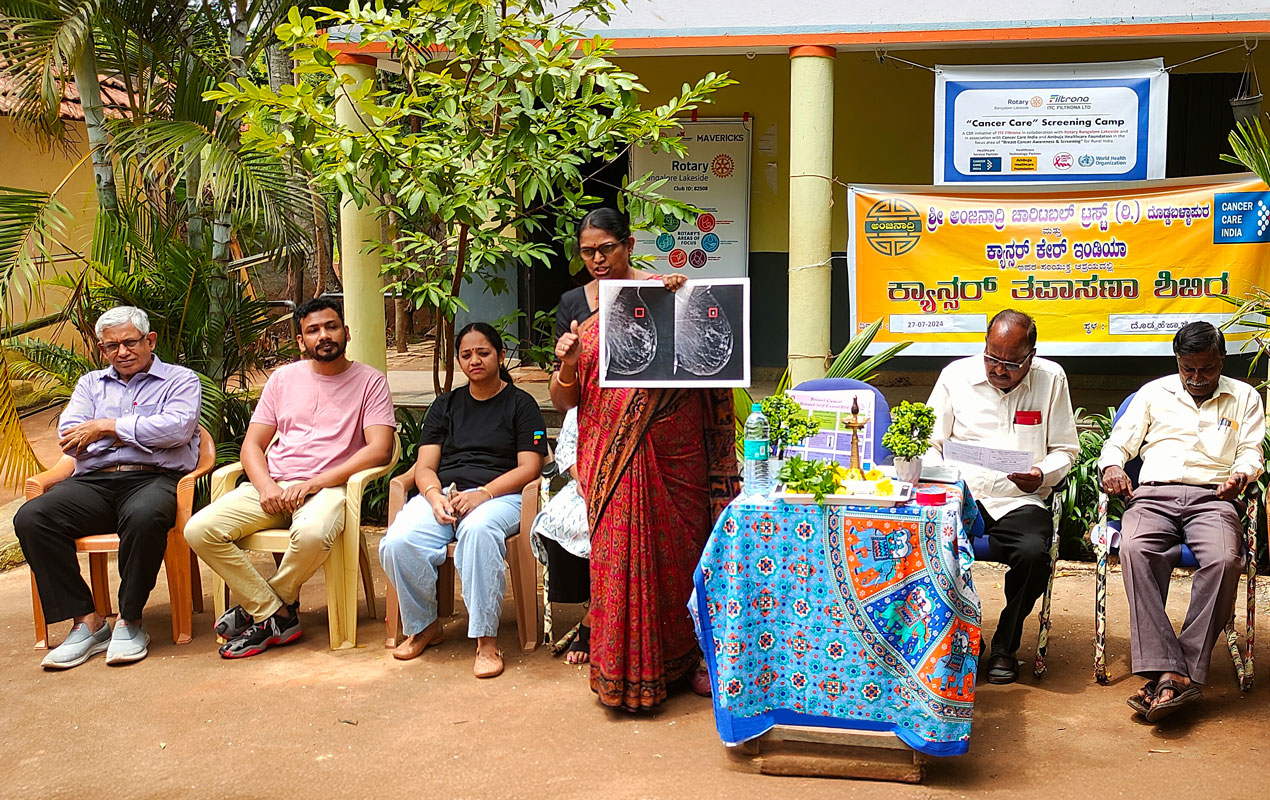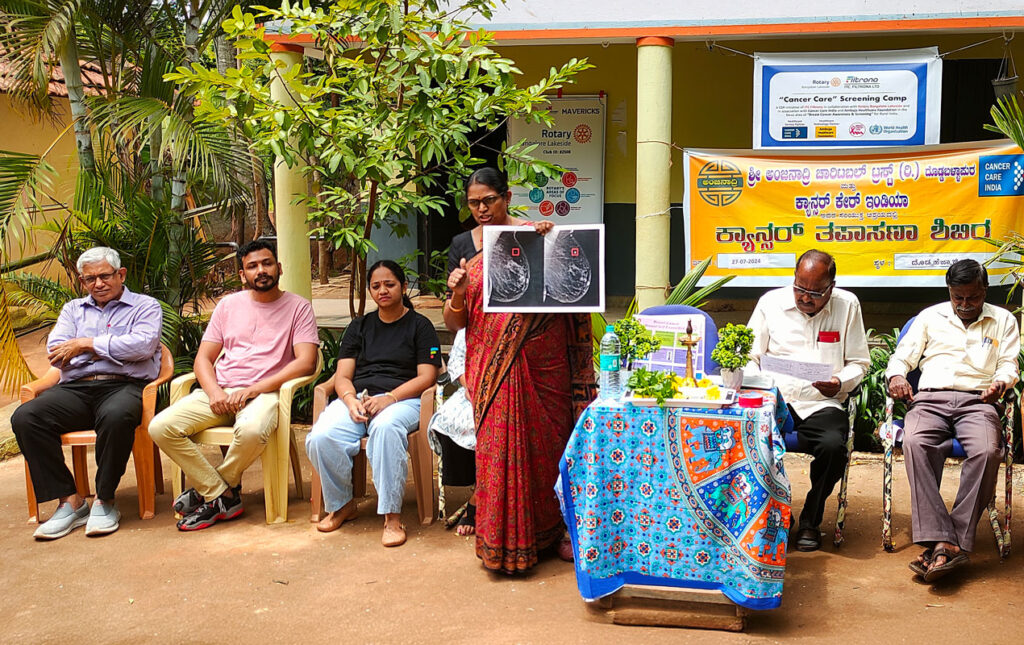Just as I was reading a tweet from industrialist Anand Mahindra about an Artificial Intelligence (AI)-induced technology which can detect breast cancer some five years before it develops, commenting that “if this is accurate then AI is going to be of significantly more value to us than we imagined and much earlier than we had imagined”, came an email from the Rotary Club of Bangalore Lakeside, RID 3191, about a strikingly similar initiative.

It detailed the collaborative effort between this Rotary club, Cancer Care India, the Ambuja Healthcare Foundation and ITC Filtrona to use a novel AI-aided breast cancer screening solution called Thermalytix, developed by Bengaluru-based Niramai Health Analytics to screen rural women through medical camps. “The advantage of this device is that it is relatively low-cost, accurate, portable, and protects the privacy of the patient,” said the note.
The club has undertaken this cancer care programme thanks to CSR funds totalling about ₹12 lakh which will enable the screening of some 1,000 women in various camps to be held in rural areas. “The biggest advantage of this device is that it is portable, and simple to operate so that not only paramedics but also other technicians can be trained to use it. The other advantage is that the woman has complete privacy; she doesn’t have to remove her clothes and she is not touched by anybody while the screening is done,” says former president of the club and the district CSR director Kashinath Prabhu, who is overseeing this project.

Thanking their partner ITC Filtrona for providing the CSR funding, he explained that the club decided to use this device for screening women in rural areas as it can be operated at any place where electricity is available and smart phones work. “This computer aided diagnostic engine is powered by AI; the solution uses a high-resolution thermal sensing device and a cloud hosted analytics solution for analysing the thermal images for reliable, early and accurate breast cancer screening,” he added.
The inaugural screening camp was held on July 27 at a government school in Doddaballapura, Bengaluru Rural district, Karnataka. Here, with help from partners, that included a local NGO which helped identify the women for screening, PHC Asha workers, and its corporate partners, and Dr R Indira, founder of Cancer Care India, who explained the way this screening works, screening was done for the identified women.
This is just one example of how innovations using AI can benefit society. I urge the ministers, policymakers, and representatives of countries at the UN to please make countrywide policy on breast cancer screening.
— Dr Geetha Manjunath
Club president Abhilasha Pandit said this project aims to conduct a series of cancer awareness and screening camps for rural women from poor and backward families. These camps will be held at the village community centres, primary health centres or government schools. Prabhu added that in the first phase of this project, “we aim to screen over 1,000 women from in and around Bengaluru. Post screening, if some symptoms or abnormalities are found, we will connect the women for the next level of follow-up consultation or treatment with our partner hospitals such as Kidwai Hospital or HCG Hospital, Bengaluru, which treat the underprivileged.”
Those who show some danger signals but do not have the cancer yet will be counselled on dietary regulation, lifestyles changes, and above all regular medical examination so that the problem, when it comes, can be tackled immediately.
On how he chose this project, Prabhu said he keeps looking out for new ideas, and once he had identified cancer care as a project, he applied for CSR funds which was originally for oral cancer as there is a lot of tobacco chewing prevalent in rural areas, but finally breast cancer screening was chosen. With the funds they have now, 1,000 rural women can be screened using this device — each screening costs ₹250, and takes about 15–20 minutes. Including counselling about 30 minutes are spent on each woman. Every day 50 women can be screened in these camps. On the accuracy of the diagnosis, he says results have been published in peer medical journals and the product is commercially available also in the UAE, Turkey, Sweden, Bulgaria, Kenya etc.
Depending on the success of this first phase, he is hopeful that more CSR funding will come in from the same and other companies. The club has ambitious plans to also take up screening for oral cancer and cervical cancer, he added.
The most heartening part of this project is that rural women will get the benefit of a new AI-aided technology for a critical healthcare need such as screening for breast cancer.
Biggest cancer killer in women
The credit for developing this easy to use and relatively low-cost cancer screening device goes to Dr Geetha Manjunath, founder and CEO of the Bengaluru-based Niramai Health Analytics. Addressing a session of the UN General Assembly in September 2023, she described herself as a computer scientist, with a PhD in AI, who has now turned a social entrepreneur. “We have pioneered a new way of detecting breast cancer using AI and radiation-free thermal scans. Breast cancer is the largest cancer killer in women today, being the topmost cancer in women in 159 countries and the second largest in others. Over 680,000 women die every year due to this cancer in India and other developing countries, where breast cancer has a 50 per cent mortality rate, which means that every alternate woman detected with breast cancer is dying. Which is a pity because this is completely curable and nobody needs to die from it.”

The high mortality rate, Dr Geetha explained to the UN delegates, was because of late detection. “In countries such as India, we are unable to provide comprehensive screening and detection with technologies such as mammography, ultrasound etc because of the cost factor and skills needed for performing the imaging and shortage of experts to interpret these images. Hand examination is the standard method of doing population screening for breast cancer today. Such an examination can only detect a 2 or 3cm lesion, by which time it is too late as the cancer has already reached Stage 2 or 3, and the result is a 50 per cent mortality rate.”
The technocrat told the assembled leaders that as this was a global problem it needed to be taken seriously, and gave them details about the new AI-aided technique developed in her lab “which comes at a fraction of the cost (of traditional screening methods) and requires minimal skills to operate. The device is portable so it can be taken out to remote areas to screen women for this dreaded disease, to detect it early and at stage zero. The test is radiation free and done in complete privacy, where nobody sees her or touches her when she is not wearing any clothes.”
Dr Geetha said the screening done by her device is clinically validated and has been done in many countries, showing “excellent results, with over 120,000 women benefiting from it. This is just one example of how innovations using AI can benefit society. In this forum, I urge the ministers, policymakers and representatives of countries to please consider making a countrywide policy on cancer screening and detecting early cancer, particularly breast cancer because it is the top killer in women. After all women form the central core of the family, when the woman is sick, the whole family is in turmoil, if she is healthy, family is happy. I also urge you to support more women entrepreneurs,” she concluded.








